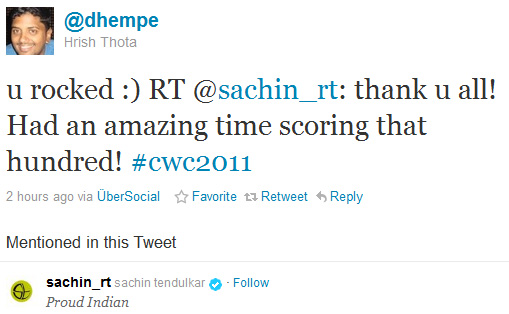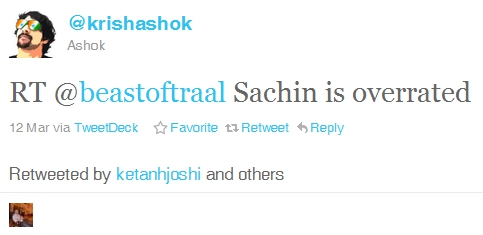Update (March 18, 2011):
Here’s Twitter’s official response to my post (that I had shared through one of the forms they have on their help pages). I should say they took it as a personal problem, when it clearly is not! Highly templat’ized and jargon’ized response.
***
It appears your report relates to Tweets that display “RT” next to a username, along with name-calling or potentially inflammatory content.
Retweets on Twitter.com are published with a unique logo, as well as a footnoted link to the user that originally published the content. The official retweet feature is described here:
http://support.twitter.com/entries/77606
This feature allows users to click-through to the original Tweet and is the officially-supported method of retweeting as it guarantees the authenticity and source of the shared Tweet. Individual Tweets like the ones you described may follow other user-innovated conventions and are not considered to be in violation of Twitter’s Terms of Service. We don’t suspend or remove user content based solely on these reports. We recommend you block the users in question to prevent these users from following you; we also won’t deliver any @replies from blocked users to your @reply tab.
Twitter provides a platform for its users to share and receive a wide range of ideas and content, and we greatly value and respect our users’ expression. Because of these principles, we do not actively monitor users’ content and will not edit or remove user content, except in cases of violations of our Terms of Service. For further information on what Twitter processes as Terms of Service violations, please see the following support page:
http://help.twitter.com/forums/26257/entries/15789-filing-terms-of-service-or-rules-complaints
***
Original post:
Consider this.
You hear from someone in your office – ‘Hey, did you know? She said that you are an idiot!’
Your blood boils and you decide to confront that other person. When you do that you get a, ‘Hey, I never said that!’.
Who would you trust? I suppose that would depend entirely on your personal perspective.
Now, use the same example in a Twitter situation. Let’s say you read an old style RT from a friend that quotes (RTs) someone else. Given the speed at which we move from tweet to tweet, we usually do not research on who said exactly what and take things at face value.
So, what if the quote turned out to be a fake? Do we have the time to go to source’s twitter stream to see whether that tweet was sent at all? Ideally, we don’t. So, we trust the RT, particular if it comes from a trusted twitter acquaintance.
Now, transpose this situation for a brand’s twitter stream. What if a mischief maker creates a fake RT of a brand’s tweet, perhaps using foul language too? After all, how difficult is it to manually type ‘RT @<brand> blah, foul abuse, blah’? Given the nature of the manic speed in twitter stream, such things could be re-retweeted without a second thought or a quick search if the brand indeed said that.
If the RT turns out to be fake, that’s a nice PR disaster waiting to happen. Like this PR mess for Chrysler, but with a fake tweet.
Next up, the brand could wash its hands off and say, ‘we never said that’!
Now, what if the person who cooked the tweet alleges that the brand deleted the tweet he retweeted, to get off the allegation that he faked it? Sounds wicked, I know, but mighty possible, I’d say.
That seems like a nice can of worms waiting to be opened.
Given how mainstream media is obsessed with quoting celebrity tweets, consider also a poorly researched media piece on a celebrity’s twitter utterance that was faked by a disgruntled fan!
All this sounds far-fetched? Here’s a mild example, to start with.
Bangalore-based Hrish Thota (@dhempe on Twitter), tweeted shortly after Sachin Tendulkar scored his 99th century in the match against South Africa on March 12th. Seconds after the century was scored, Hrish’s tweet went,
Now, the entire Indian population knows that @sachin_rt is Sachin Tendulkar’s official Twitter handle. So, they’d perhaps love this tweet too. But some people had to pose this question – he just scored his century and is in the field playing. Where did he tweet from? Does he have a twitter assistant who tweets? Possible, but a simple search on Sachin’s twitter stream showed that his last tweet was actually on December 7, 2010! So, at least in this instance, it was obvious that Hrish was just indulging in some harmless fun.
I tweeted about this twitter RT exploitation briefly after seeing Hrish’s fake RT and another twitter use, Krish Ashok, went a step ahead in demonstrating what it actually mean, with this tweet.
This tweet got me 9 more tweets (in the form of RTs or responses) in which they assumed that it was my tweet in the first place!
Here is another example of this exploitation’s possibility, involving General Motors US! In this instance, at least there is no malice involved and it seems like a genuine mistake.
My only concern is that this is a Twitter loophole that could be exploited in many interesting and creative ways – limited only by a mischief monger’s imagination.
So, how could Twitter help in avoiding such situations? A few possible options.
1. Twitter could stop allowing its users to delete tweets. This is the harshest way out, but.
2. Twitter could add a ‘tweet deleted’ message in the twitter stream of a person, complete with time and date stamp, after a tweet has been deleted, so that there is at least some trace left that a tweet was deleted. Right now, a deleted tweet vanishes from the face of the earth much like how Superman vanquishes the bad guys. This could help look up claims of tweet deletion and help fight counter claims alleging deletion.
How else? Is there any other way Twitter could change/update its platform to avoid fake RT exploitation?
From a personal twitter usage point of view, this may not seem like a big deal, but, for brands, this could be a nasty, unnecessary headache. This is very different from how we quote things in other online forms. In a blog, for instance, if there’s no source link to a quote, we tend to disbelieve it immediately, without taking things at face value – that is more to do with the time we like to spend with (reasonably) long form content.
Twitter is vastly different and such micro-short form content deservedly gets only micro-short attention span. But, my point is about how things could horribly wrong if a fake tweet is picked out of the platform, into mainstream media.


